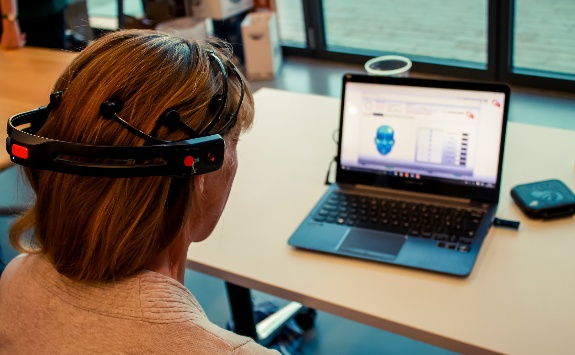Behavioural Science and Psychology
We aim to understand the behaviour of whole organisms, covering both humans and non-human animal species.
The vision of the Behavioural Science and Psychology Research Theme is to:
- foster collaboration across diverse approaches and perspectives to understand the behavioural and mental processes of humans and other animals
- build a strong international reputation for high quality, ethical, and open research in emotion, cognition, perception, and social behavioural sciences
- make a societal impact by training interdisciplinary behavioural scientists and informing policy and practice to improve the wellbeing of individuals and populations
Research in the Theme spans from the fundamental to the applied. It encompasses research on a range of species, from insects to humans. The main research strengths of our Theme are:

Emotion and wellbeing
- Dr Bronia Arnott, Knowledge Exchange Broker
- Infants, children, young people and families, Mental health, Stress, Relationships, Qualitative research, Involvement and engagement
- Prof Melissa Bateson, Professor of Ethology
- Animal cognition, Animal welfare, Affective balance, Cumulative affective experience, Food insecurity, Risk and uncertainty, Unpredictability, Obesity, Metabolic rate, Hungry phenotype, Telomere length dynamics
- Dr Francesca de Petrillo, Lecturer
- Animal cognition, comparative psychology, animal behaviour, decision-making, risk and uncertainty, cognitive control, cognitive evolution, moral decision-making, non-human primates, children
- Dr Tracy Donachie, Lecturer in Sport and Exercise Psychology
- Perfectionism, personality, perfectionistic cognitions, emotions, mental health, anxiety, burnout, intervention, sport psychology, education.
- Prof Mark Freeston, Professor of Clinical Psychology
- Mental Health, Intolerance of Uncertainty, Treatment Development, Neurodiversity, Climate Change
- Dr Peter Gallagher, Senior Lecturer
- Mood disorders, depression, bipolar, dementia, facial expression of emotion
- Dr Fiona Gullon-Scott, Senior Lecturer
- neurodivergence, mental health, student wellbeing, autism, ADHD, therapy, support, autistic women & non-binary
- Dr Franziska Hartung, Lecturer in Cognitive Psychology
- (neuro)aesthetics, narrative, bibliotherapy, creative arts therapy, narrative engagement, lifelong reading
- Dr Laura Lindsey, Lecturer
- Serious mental illness, shared decision making, antipsychotic withdrawal, informal carer involvement
- Dr Vivek Nityananda, BBSRC David Philips Fellow
- Sensory Ecology, Comparative Cognition, Animal Welfare, Insects, Vision, Optimism, Overconfidence, Cognitive Biases
- Prof Emily Oliver, Professor of Behavioural Sciences
- Mental health, thriving, holistic health, interactions between physical and mental health, autonomy, motivation, physical activity.
- Dr Colline Poirier, Senior Lecturer
- animal welfare, animal behaviour, mood disorders, stress, affective states, MRI, brain plasticity, hippocampus
- Dr Barbara-Anne Robertson, Lecturer
- Emotional processing, emotional episodic memory, visualisation of emotional experiences, stress, chronic stress, compassion fatigue, hippocampus, HPA axis, mental health, post-traumatic stress, stress-related forgetting, stress-related memory errors
- Dr Lucy Robinson, Reader in Clinical Psychology
- mental health, student and young people’s mental health, idiographic methods, cognitive behavioural therapy
- Dr Johnny Roughan, Staff Scientist
- Behaviour, Pain, Animal Welfare, Affective State, Cognitive Bias, Analgesic self-administration, Conditioned Place Preference, Grimace Scales, Non-aversive handling, Non-pharmacological Analgesia.
- Prof Candy Rowe, Professor of Animal Behaviour and Cognition
- Animal cognition, Animal welfare, Animal communication, Evolution of cognition, Affective states, Decision-making, Human behaviour change, Research culture
- Dr Tom Smulders, Reader in Evolutionary Neuroscience
- Brain evolution, avian brains, telencephalic stress regulation, HPA axis, hippocampus, neurogenesis, chronic stress, animal welfare
- Dr Helen St Clair-Thompson, Reader in psychology
- Mental toughness, Resilience
- Dr Kate Swainston, Senior Lecturer
- Psychological interventions, coaching psychology, quality of life, patient reported outcome measures, hope
- Dr Quoc Vuong, Senior Lecturer
- Multi-sensory cognition, pain perception, affective processing
Cognitive and perceptual mechanisms
- Prof Melissa Bateson, Professor of Ethology
- Animal cognition, Animal welfare, Affective balance, Cumulative affective experience, Food insecurity, Risk and uncertainty, Unpredictability, Obesity, Metabolic rate, Hungry phenotype, Telomere length dynamics
- Dr Francesca de Petrillo, Lecturer
- Animal cognition, comparative psychology, animal behaviour, decision-making, risk and uncertainty, cognitive control, cognitive evolution, moral decision-making, non-human primates, children
- Dr Peter Gallagher, Senior Lecturer
- Mood disorders, depression, bipolar, dementia, facial expression of emotion
- Dr Fiona Gullon-Scott, Senior Lecturer
- neurodivergence, mental health, student wellbeing, autism, ADHD, therapy, support, autistic women & non-binary
- Dr. Franziska Hartung, Lecturer in Cognitive Psychology
- social cognition, social perception, empathy, stigma, narrative processing, brain processes in fiction reading, brain connectivity, (neuro)aesthetics, situation models, perspective taking, event cognition
- Dr. Sarah Knight, Lecturer
- Speech perception, vocal identity, vocal trait perception, auditory perception, cognitive listening
- Dr. Scott McDonald, Senior Lecturer
- Neuropsychology, Cognitive assessment, Healthy cognitive ageing, Mild Cognitive Impairment, Dementia, The ageing brain, Interventions to aid cognition
- Dr Vivek Nityananda, BBSRC David Philips Fellow
- Sensory Ecology, Comparative Cognition, Animal Welfare, Insects, Vision, Optimism, Overconfidence, Cognitive Biases
- Dr Colline Poirier, Senior Lecturer
- animal welfare, animal behaviour, mood disorders, stress, affective states, MRI, brain plasticity, hippocampus
- Dr David Pritchard, Lecturer
- Animal cognition, ethology, spatial memory, decision-making, navigation, vision, foraging, cognitive ecology, construction behaviour, metascience.
- Dr Barbara-Anne Robertson, Lecturer
- Emotional processing, emotional episodic memory, visualisation of emotional experiences, stress, chronic stress, compassion fatigue, hippocampus, HPA axis, mental health, post-traumatic stress, stress-related forgetting, stress-related memory errors
- Dr Johnny Roughan, Staff Scientist
- Behaviour, Pain, Animal Welfare, Affective State, Cognitive Bias, Analgesic self-administration, Conditioned Place Preference, Grimace Scales, Non-aversive handling, Non-pharmacological Analgesia.
- Prof Candy Rowe, Professor of Animal Behaviour and Cognition
- Animal cognition, Animal welfare, Animal communication, Evolution of cognition, Affective states, Decision-making, Human behaviour change, Research culture
- Dr John Skelhorn, Senior Lecturer
- Animal Behaviour, Animal communication, Antipredator defences, Aposematism, Avian cognition, Camouflage, Crypsis, Death feigning, Evolutionary Ecology, Eyespots, Foraging, Masquerade, Mimicry, Predator-prey interactions, Signal evolution
- Dr Tom Smulders, Reader in Evolutionary Neuroscience
- Brain evolution, avian brains, telencephalic stress regulation, HPA axis, hippocampus, neurogenesis, chronic stress, animal welfare
- Dr. Margreet Vogelzang, Lecturer
- Language, Communication, Cognition, Executive functions, Multilingualism, Attitudes, Neurodivergence, Hearing loss, Ageing
- Dr Quoc Vuong, Senior Lecturer
- Multi-sensory cognition, pain perception, affective processing
Social behaviour science and public health
- Dr Bronia Arnott, Knowledge Exchange Broker
- Social determinants, Inequalities, Knowledge mobilisation, Complex intervention development and evaluation, Involvement and engagement
- Dr Beth Bareham, NIHR Fellow
- alcohol, addictions, mental health, older adults, ageing, health psychology, intervention development, health services, psychosocial interventions
- Dr Kirsten Brandt, Senior Lecturer
- Nutrition, micronutrient intake, self-selection, feedback regulation, homeostasis, flavour nutrient learning.
- Dr Tracy Donachie, Lecturer in Sport and Exercise Psychology
- Perfectionism, personality, perfectionistic cognitions, emotions, mental health, anxiety, burnout, intervention, sport psychology, education.
- Dr Fiona Gullon-Scott, Senior Lecturer
- autism & child protection policies, fabricated induced illness, autism training, evaluation
- Dr. Sarah Knight, Lecturer
- Vocal communication, social judgements, attitudes, ageing
- Dr John Lazarus, Associate Researcher
- evolution, adaptation, animal gregariousness, cooperation, altruism, communication, mate choice, social policy
- Dr Laura Lindsey, Lecturer
- Serious mental illness, shared decision making, antipsychotic withdrawal, informal carer involvement
- Dr Scott McDonald, Senior Lecturer
- Neuropsychology, Cognitive assessment, Healthy cognitive ageing, Mild Cognitive Impairment, Dementia, The ageing brain, Interventions to aid cognition
- Prof Emily Oliver, Professor of Behavioural Sciences
- Interactions between physical and mental health, motivation, physical activity, public health policy, health systems, thriving.
- Dr Zachary Petzel, Lecturer
- stress, alcohol, addiction, stigma, stereotypes, discrimination, attitudes, behavior change, psychophysiology
- Dr Benjamin Rigby, Lecturer in Behavioural Science
- Physical activity, behaviour change, healthy ageing, complex systems, policy, intervention development
- Ms Ashleigh Stamp, Clinical Fellow
- dentistry, children and adolescents, conscious sedation, behavioural management, dental education, inter-professional education, service provision
- Dr Helen St Clair Thompson, Reader in psychology
- Working memory, Executive functions
- Dr Kate Swainston, Senior Lecturer
- Health behaviour change, cancer screening and survivorship, pre-optimisation for surgery, optimising symptom management, multimorbidity, pain, problematic drug and alcohol use, health needs assessment, palliative and end of life care
- Dr Shelina Visram, Senior Lecturer
- health inequalities, marginalised populations, gender, intersectionality, qualitative research, participatory approaches
- Dr. Margreet Vogelzang, Lecturer
- Language, Communication, Cognition, Executive functions, Multilingualism, Attitudes, Neurodivergence, Hearing loss, Ageing
Other units studying behaviour at Newcastle University
Centre for Behaviour and Evolution
PhD funding opportunities
Contact a potential supervisor if you are interested in applying for:
BBSRC Newcastle-Liverpool-Durham Doctoral Training Programme
ESRC Northern Ireland and North-East England Doctoral Training Centre
